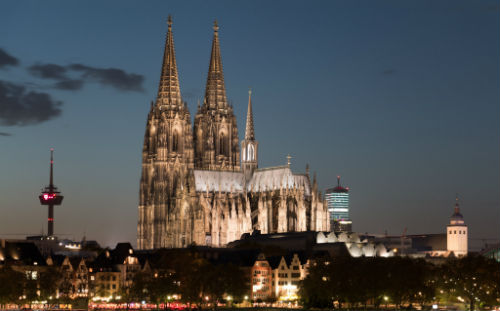This Thanksgiving: Remember Germany’s ‘Song of Thanks’
By Neil Earle
 Beautiful Cologne Cathedral that helped spread Rinkart's great hymn stands proudly as a survivor of massive bombing in World War Two.
Beautiful Cologne Cathedral that helped spread Rinkart's great hymn stands proudly as a survivor of massive bombing in World War Two.Someone once said that the Church is never more united than when she is singing the great hymns. Sometimes the story behind the hymns is utterly fascinating and inspiring. This is so true of a hymn penned by a German pastor titled “Now Thank We All Our God.” This song has travelled around the world and found adherents in most denominations. North Americans have embraced it as their own every Thanksgiving, not aware of the truly remarkable story behind it.
Germany Devastated
That story is set in the tragic Thirty Years War of 1618-1648 which devastated Central Europe. A young pastor named Martin Rinckart was assigned the Lutheran church at Eilenburg, a walled city presently some 27 km from Leipzig. In the midst of the horrors, mass executions and starvations of that war, young Martin Rinckart found himself the only priest-pastor left in the city. Six Protestant and Catholic-sponsored armies were wreaking havoc in Germany – only surpassed by World War Two.
Historians Will and Ariel Durant in their Story of Civilization, mention that population in Germany and Austria fell from 21,000,000 to 13, 500,000 (The Age of Reason Begins, page 567). Some writers claim that one might travel sixty miles without seeing a village or house. Both sides hired cruel mercenaries and mercy was in short supply in such cities as Magdeburg where 20,000 out 36,000 were massacred.
Losing a Wife
Pastor Martin Rinckart soon found himself dealing with starvation as refugees poured into Eilenburg. Then came the plague. Some 6000 may have died in Eilenburg and he found himself doing 40-50 funerals a day. His own wife died. The story goes that one day in 1633 Rinckart came home for a meager meal with his children. From somewhere (we know where) came the words which became his call to grace before eating. It opened like this:
Now thank we all our God,
With hearts and hands and voices,
Who wondrous things have done,
In whom His earth rejoices;
Who from our mother’s arms
Has blessed us on our way
With countless gifts of love,
And still is ours today.
 Martin Rinckart (1586-1649)
Martin Rinckart (1586-1649)How amazing that Rinckart could write that prayer considering all that was going on around him. How could he – how could anyone – muster up the faith to declare praise to God at such a time, with his family barely having enough to eat? But faith is the key word in this story.
The Bible describes true faith as a supernatural gift from God once a person has surrendered to Him and begged him for the grace to endure (Ephesians 2: 8; Philippians 4:6).
As a Christian pastor, Martin Rinckart well knew that his Savior, Jesus Christ, had promised that this gift of faith would always be with him. He knew that in John 4:14 Jesu had said, “Those who drink the water I give them will never thirst. Indeed, the water I give them will become in them a spring of water welling up to eternal life.” Rinckart knew that the Holy Spirit, the very powerful manifestation of God in action, this power which made the universe, can take up residence inside Christians (Ephesians 3:20; John 14:23). Such a living hope made it possible for Pastor Rinckart and his tiny flock to endure…and to flourish as they sang hymns together.
Christian Diplomacy
Now real Biblical faith is practical, it is a boon to both Christians and their neighbors. In the 1630s a foreign army appeared outside the city gates to besiege Eilenburg for the second time. The general demanded a steep ransom or the city would be put to the sword – not a vain threat in those days. Pastor Rinckart, the story goes, led some of his best followers to parley with the besieging army.
The general flatly refused to lower the terms.
Like another Martin, Martin Luther King at the bridge in Selma, Alabama, Rinckart then and there called his people to prayer. “Come, my children, we can find no mercy with men, let us take refuge with God.” The small flock fell on their knees and prayed fervently. They then sang a popular hymn. The opposing general was impressed. His nobler nature was stirred. The city was spared. Imagine Rinckart’s joy in learning that his prayer of thanks had been powerfully answered.
Come Bach and Mendelssohn
A few years after Rinckart’s death, the chief musician at the University of Berlin set his stirring words to music. Even Bach and Mendelssohn later took a hand at rearranging it. In the 1850s an American scholar translated it into English and it became a chief Thanksgiving hymn sung in almost all the churches of the New World.
Rinckart’s message thus lives on today every place his words are sung. And what a lesson in faith, that no matter what our outward circumstances or how far away we feel from God or even if we have never prayed to him before, we can always say “Thank you.” Someone once said that if we were not thankful we would go insane with the perplexities and irregularities of life’s experiences. How true. On this thanksgiving, let’s be thankful for the great hymns and the God who inspired them and sing them with gusto.